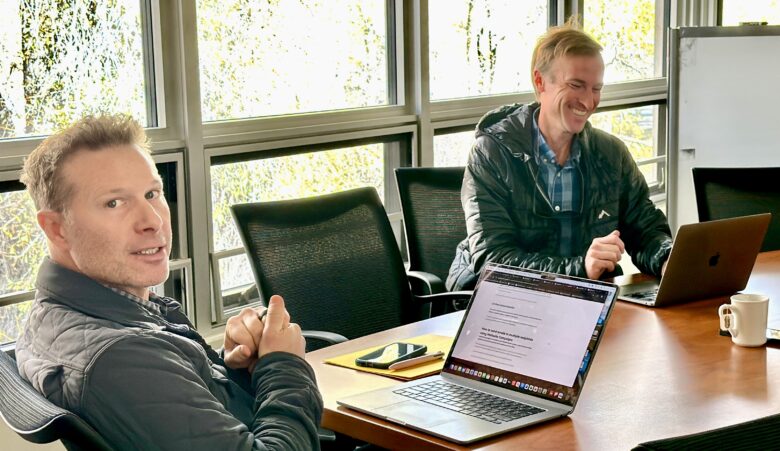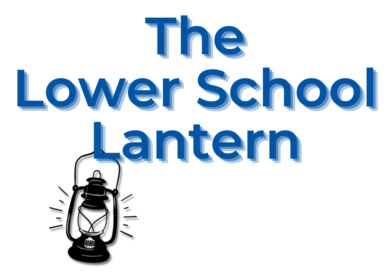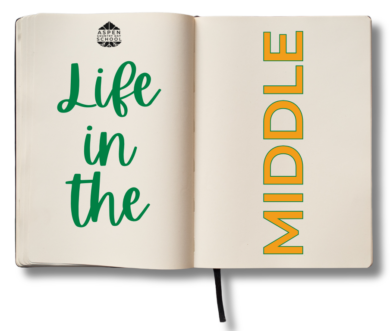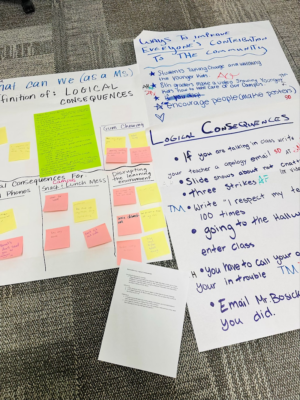Stories
Educator Insights
January 22, 2025

Monthly thoughts from Aspen Country Day School’s academic leaders
Mark Bosick, Head of Middle School and Adam Hancock, Head of Lower School
Understanding, learning, and the wisdom to know the difference: Lower School | January 2025

Dear Parents,
At Aspen Country Day School, we facilitate learning throughout the arc of the school journey for our students. This core function of all schools is simple enough on the surface, however, the art and science of teaching is a complex craft. Oxford Languages defines learning as the acquisition of knowledge or skills through experience, study, or by being taught. In the Lower School, our educators seek to cultivate and nurture students who will discover success in life, both in their present childhood, but also later throughout adolescence and adulthood. ACDS recognizes that while a student’s knowledge is important, a child’s understanding in life is paramount.
Formal Assessment
Educators at Aspen Country Day foster relationships with students that lay the foundation for meaningful learning. A single facet of knowing each student is a measure of their cognitive strengths and challenges. Insights into these attributes are gleaned at a minimum 3x/year. Formally, the Lower School at ACDS explores cognition in reading and math using NWEA’s MAP Growth and Acadience Learning Online. Data from these assessments is used by teachers to guide student groupings, determine progress towards meeting a goal, or provide feedback around knowledge of a certain concept. In order to build an educational partnership in support of our learners, we share this information with parents throughout the academic year. Click here to read more about academic reporting at ACDS.
Informal Assessment
Building on these triennial, formal views into student learning, educators at ACDS gauge the student experience in myriad ways. These measures begin at the threshold of the classroom where a teacher greets students daily. The educator may offer a choice of greeting (high-five, verbal, hug) and the student’s selection provides a glimpse into how the child is doing that particular morning. Each day in the Lower School, evaluating the “pulse” of our students is key to success. These informal observations and assessments are conducted nearly every minute of each day in the Lower School. Does a child recognize how to join a game already in progress? How did it work for the mathematician when they tried the new strategy taught this morning? Did the young scientist remember to don their gloves before the cow eyeball dissection and wash their hands afterward? While micro in their implementation and execution, these quick glimpses into student life yield macro data around academic and social habits, but more importantly, student understanding.
Knowledge Versus Understanding
Jerome Bruner in The Culture of Education described understanding as, “Being able to go beyond the information given to figure things out…” As we teach the eager young minds at Aspen Country Day, we constantly evaluate the acquisition of knowledge. We believe, however, that the world of a young mind is more complex than that singular facet. Performance on a test can be enhanced by knowledge, but navigating life successfully requires understanding. Ron Ritchhart in Creating Cultures of Thinking contends that, “…understanding goes beyond merely possessing a set of skills or a collection of facts in isolation; rather understanding requires that our knowledge be woven together in a way that connects one idea to another.” We seek to achieve student understanding through intentional integration of the academic program. Learning developed through projects lends itself naturally to this deeper understanding. Students in the second grade develop understanding of a micro-economy through the engaging economics fair. Fifth grade learners integrate geography, mathematics, and social sciences in a deep dive into our National Parks. And the student understanding on the spring outdoor education trips in Kindergarten and First grades is enhanced by pre-teaching the basics of paleontology in science and then bringing it to life in the Colorado National Monument.
Portrait of an ACDS Graduate
While a snapshot of student knowledge is relatively easy to obtain, a window into student understanding is more nuanced. Through tracking our graduates and “following” them beyond the ACDS campus, we gain insights into how students fare in the real world. In the Lower School, through truly knowing students and guiding them daily, we focus our work by the ACDS Graduate Outcomes. These measures truly reflect students who possess knowledge in concepts and skills, but also understand more about how to navigate the world they enter once walking across the stage at graduation. We seek to nurture and cultivate:
- critical thinkers and problem solvers
- independent learners who also collaborate effectively with peers
- confident and self-aware individuals who are curious and resourceful
- self directed learners who recognize their potential and strive to fulfill it
- responsible citizens who contribute positively to their communities
- global thinkers whose outlook is grounded in a sense of place and environmental responsibility
Thank you for trusting us with this important work. We value our relationship with ACDS families and appreciate your support.
In partnership,
Adam
Logical consequences and how we approach character education: Middle School | January 2025
 Dear Middle School Families,
Dear Middle School Families,
At ACDS Middle School, we recognize that early adolescence is a remarkable time of growth and transformation. We also understand that navigating these years comes with challenges—challenges that feel especially profound in today’s fast-paced and complex world. As concerns about the emotional and physical well-being of young people continue to grow, research consistently underscores the vital role that relationships with caring adults play in a young person’s development. Families and students choose independent schools like ours because of the personalized attention and meaningful connections fostered by our small classes and dedicated faculty. That’s why we approach character education with the same care and intention as we do academics—helping your child build the skills and values they need to thrive now and in the future.
Building a Foundation Together
Character development in our community begins with shared agreements and norms. Rather than imposing a long list of rules, we collaborate with students to create a framework grounded in respect and responsibility. These agreements provide guidance and structure while empowering students to make thoughtful choices and take ownership of their actions. By focusing on collaboration and mutual understanding, we teach students how to navigate relationships and responsibilities with confidence.
As part of this commitment, I made a promise to our middle school students that they would have a say in the systems and structures we operate under. Their voices would be heard, and their perspectives and experiences would matter. This promise was central to yesterday’s middle school assembly, where students and faculty gathered to review, reflect, and reaffirm our shared values.
During the assembly, I explained, “We are here today because we all care deeply about each other and our community. When we live by the agreements we’ve created together, we thrive, and our community thrives. Right now, we have an opportunity to reflect, reset, and strengthen our commitment to these agreements. Lately, we’ve noticed gum where it shouldn’t be, loud behavior in quiet spaces, roughhousing in hallways, disruptive behavior in classrooms, and messes in the dining hall. These actions don’t align with the agreements we’ve made as a community. What message do we send to our classmates, teachers, or even ourselves when we leave a mess or act in ways that disrupt the spaces we share?”
I also introduced the concept of logical consequences, explaining that community agreements come with shared responsibility and, when needed, appropriate next steps when those agreements are broken. To emphasize this, I asked the students, “What should the next steps from the school be when agreements are ignored or broken? What would make sense?” Students were then dismissed to their small advisory groups to discuss their feelings about this reset, the new restriction (no eating outside for a week), and what support should be in place to help middle schoolers uphold their responsibilities. Here are some photos of what the students came up with.

I closed the assembly with a message of trust and encouragement: “I trust this community to rise to the occasion and live up to the expectations we’ve set together. Let’s hold each other accountable—not out of punishment, but because we care about this school and each other.”
Why Conversations Matter
Middle schoolers are naturally curious, energetic, and, at times, boundary-pushing—a natural part of growing up! When challenges arise, we view them as opportunities for meaningful conversations. Through dialogue, we help students reflect on their choices and understand their impact on others. These conversations build communication skills, foster empathy by exploring the feelings and needs behind behaviors, and encourage students to take responsibility for their actions while finding ways to make amends. This approach not only addresses the moment but also equips students with tools to handle life’s ups and downs.
Creating Order, Not Control
Children thrive in an environment that feels safe, predictable, and fair. At ACDS Middle School, we create order by establishing clear routines and consistent expectations. This structure helps students feel secure and supported while they learn to make choices aligned with their values. Unlike control, which relies on power and compliance, order invites collaboration and promotes self-discipline—skills that will benefit students throughout their lives.
Teaching Through Making Mistakes
We view mistakes as an opportunity to guide and teach, rather than to punish. Our approach emphasizes preventing problems before they arise, fostering open communication and mutual respect, and helping students develop fairness, responsibility, and problem-solving skills. When mistakes do happen, we focus on logical consequences that encourage growth and learning. We work with students to reflect, repair, and move forward with confidence. By creating an environment where every child feels valued and understood, we help build resilience and empathy, preparing them for the challenges ahead.
Preparing for What’s Next
We believe every child has the capacity for greatness. Our goal is to help them embrace challenges as opportunities to grow, whether they’re navigating a tough situation with a friend or finding their voice in a group project. By focusing on relationships, reflection, and responsibility, we aim to equip students with the character and skills they’ll need to live with integrity and compassion.
As family psychologist Ashleigh Warner so beautifully said, “Beneath every behavior there is a feeling. And beneath each feeling is a need. And when we meet that need, rather than focus on the behavior, we begin to deal with the cause, not the symptom.” This belief shapes everything we do as we work together to support your child’s growth.
Thank you for trusting us with this important work. Your partnership means the world to us, and we’re grateful to be on this journey with you and your family.
Making space for rest, play & connection: Middle School | December 2024
 Dear Middle School Families,
Dear Middle School Families,
Sometimes I imagine setting up a lifeguard stand right outside my office, strategically placed where two hallways meet—the epicenter of middle school traffic. Picture it: me with a red whistle in hand, ready to shout commands like ‘No running in the halls!’ or ‘Slow down, please!’ It’s a whimsical nod to my own childhood, when my friends and I were the ones being scolded for dashing around the local pool and totally unaware of anything outside of our little world. Life has a funny way of flipping the script, doesn’t it?
Some places, such as my community pool, might frown upon twirling around corners, skipping from one spot to another, or breaking into a little song and dance when you see a friend across the way. But not here on the Castle Creek campus. These joyful moments are what make our school feel so alive.
There’s a little bench built into the wall outside my office, and while I’m pretty sure the architect never thought it would become a makeshift stage for skateboard-like moves, our students have found a way to make it their own. The stairwell railings? Let’s just say it’s become prime real estate for impromptu slides, much to my daily reminders! And while you’ll often hear a gentle “Walk, please!” or “Hands to yourself!” echo through the hallways, these are the moments we cherish. The hugs, high-fives, skips, spins, slides, and spontaneous laughter remind us of something important: we get to work with kids.
Our middle school students are in the wonderful, messy process of growing up—learning to navigate the world, but still full of that magical, playful energy that makes childhood so extraordinary. It’s a joy to watch them. Whether it’s four friends walking shoulder-to-shoulder down the hallway, making it nearly impossible to pass, or a group bursting into giggles over something silly, this is what a happy, connected community looks like. And it’s not just the kids—it’s the teachers and staff who help create this environment. The love, care, and encouragement our faculty pour into each day make this school a place where kids can be themselves, take risks, and thrive.
As winter break approaches, I hope you’ll join me in encouraging our students to just be kids. They’ve worked hard this semester—learning, growing, and showing so much maturity. Now it’s time to let them slow down a bit. Let them color, sing, play, and imagine. Let them build a fort, throw snowballs, invent a new game, or stay in pajamas all day. Let them do the things that make childhood sweet and memorable. We all know how quickly these years go by, and how the pressures of growing up sometimes creep in far too soon.
So, this holiday season, let’s make space for rest, play, and connection—for our kids and ourselves. From all of us here at Aspen Country Day Middle School, happy holidays to your family. And if we happen to see you skipping or twirling alongside your kids, no judgment here. In fact, we’d probably join you. Here’s to keeping the joy alive in all of us.
With gratitude,
-Mark Bosick
Being seen and known: Lower School | December 2024
 When interviewing candidates for faculty or staff positions at Aspen Country Day School, I always provide space for the applicant to pose questions to the hiring committee. When a candidate posed a question to the team last week, their question resonated with me. At risk of misquoting, their query paraphrased was, How would the following three constituencies voice their feelings about ACDS? A young student, an older student, and a faculty member.
When interviewing candidates for faculty or staff positions at Aspen Country Day School, I always provide space for the applicant to pose questions to the hiring committee. When a candidate posed a question to the team last week, their question resonated with me. At risk of misquoting, their query paraphrased was, How would the following three constituencies voice their feelings about ACDS? A young student, an older student, and a faculty member.
The astute hiring committee paused, and then dove right in. While the contributions varied, common threads included a supportive, cohesive community and students who are “seen and known.” While the array of responses left me feeling uplifted about the learning journey that is an ACDS education, the part about being “known” as a student really hit me. Upon reflection, I can state with confidence that this idea of truly knowing our students is central to our work at ACDS and perhaps a main ingredient in our secret sauce.
Social psychologist at Brown University, Gregory Elliott, describes “mattering” as do people have an interest in you and what you have to say? As the applicant listened to the hiring committee describe how students at ACDS are valued and known, I hope they came away with an understanding that at Aspen Country Day, all students matter. In her important work, Never Enough: When Achievement Culture Becomes Toxic, Jennifer Wallace states, “The more we feel valued, the more likely we are to add value, and the other way around – a virtuous cycle of interdependence that continuously feeds our sense of mattering.” She adds that we learn our value, how we matter, by our caregivers at home and in the community. At ACDS, our students learn that they are truly known, and each has value as a part of our educational community.
What does mattering look like in the Lower School at Aspen Country Day? On the surface, students know they matter because they are named. Each child is greeted daily at the front door by me, Cec, Allie, and at times Sara and MJ. The students are high-fived, hugged, and warmly embraced by our team as they start their day. Once in their classroom, students are engaged authentically with classroom responsibilities and are charged with having agency in their learning environment. This might involve routines such as keeping an academic planner, or “jobs” like straightening up the snow boots after recess. Students are heard in the classroom and teachers give voice to learners. Projects involving choice and expression of student interests are found throughout our grades. At ACDS, the students matter.
As you consider the value of your investment in Aspen Country Day School, I encourage you to consider the applicant’s question, How would a student voice their feelings about ACDS? Your student may not share it in the same way, but if you truly listen to their response, I hope you will hear that they matter to those around them.
I hope you have a wonderful holiday season with those you love. Thank you for trusting the ACDS team to guide your children. Please know that we value your child’s presence at ACDS and we look forward to seeing their smile once again in 2025.
In partnership,
Adam